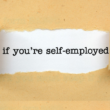If You’re Self-Employed, Are You Eligible for Disability Benefits?
September 3, 2023
About one of out of every ten U.S. workers is self-employed, according to the U.S. Bureau of Labor Statistics.
That adds up to more than 16 million Americans. If you’re self-employed, you may wonder if, due to an illness or injury leaving you unable to work, you can get Social Security Disability Insurance (SSDI) benefits.
“The good news,” says Nash disability lawyer Demetra Geller, “is you can qualify for these benefits, but—as is always the case—there are terms and conditions you must meet.”
To qualify for SSDI all applicants (whether self-employed or not) must have a disability that has lasted or is expected to last at least one year which prevents them from being able to work.
If you are self-employed, you must have accurately reported your income on your tax returns in order to be approved for Social Security Disability.
You must have paid Social Security taxes. Employees pay Social Security taxes through the deductions from their paychecks. Those who are self-employed must pay these taxes—called self-employment taxes—on their own.
The Internal Revenue Service says the Social Security tax for the self-employed is 12.4% of net earnings up to an annual threshold amount. You also pay a 2.9% Medicare tax. In total, this equals 15.3%, known as your self-employment taxes.
If you earn more than $200,000 (or couples earning more than $250,000), you’ll have to pay an additional 0.9% in Medicare tax. (You can find more details on self-employment taxes in the Social Security’s brochure “If You Are Self-Employed.”)
You must have worked long enough and recently enough to qualify for disability benefits. Social Security measures this with work credits. The number of work credits you need to qualify for disability benefits depends on your age when your disability begins. Generally, you need 40 credits, 20 of which were earned in the last 10 years, ending with the year your disability began.
What if, like many other American workers, you paid Social Security taxes as an employee at jobs you held in the past and now have been self-employed for years but have not paid self-employment taxes?
“We get many callers who are in this situation,” Ms. Geller explains. “They want to know if they are insured and eligible for SSDI benefits. The answer is no, they are not eligible, because in Social Security’s view not paying Social Security taxes means they have not worked recently enough. If you are in this situation, you must wait until retirement age to take out what you paid in, or work and pay in more.”
Whether you are an employee or self-employed and unable to work due to illness or injury, the road to winning the disability benefits you have earned is long and difficult to navigate.
The experienced Chicago Social Security Disability lawyers at Nash Disability Law are here to help you.
A Government Accountability Office study showed that if a claimant had a representative such as a disability lawyer when they went to their hearing with a disability judge, they were almost three times more likely to be allowed benefits than someone who had no representation at all.
Contact us today for a free evaluation of your situation.


